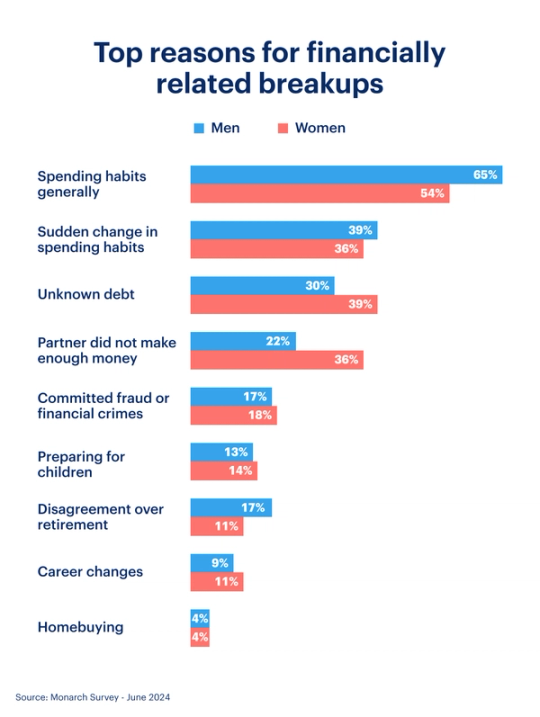Like most viral trends, the “Im looking for a guy in finance” song rippled through social media and fizzled just as quickly. However, if you squint, you’d see a larger cultural trope underlying the catchy beats: Americans choose and keep partners based on how much they make.
But, is that actually true?
In June 2024, Monarch surveyed 1,000 Americans about various money beliefs, especially in regard to dating, relationships, and marriage. In the coming weeks, we’ll be sharing insights from that survey.
Today, we’re exploring the cause of financially related breakups. If the trope is to be believed, Americans would report relationships ending because their partner is not making enough.
In the survey, we asked if the respondents were part of a relationship that ended due to financial reasons. Despite the cultural conversation around the importance of “earning six figures” for potential partners, spending habits are more of a concern for both men and women. Spending habits (56%) and unknown debt (41%) are the #1 and #2 culprits when relationships are ended for financial reasons.

Other statistics showcasing income’s role in love and relationships:
- Only 16% of respondents believed that their partner should make more than them.
- The majority, 56%, said they have no income expectations of potential partners.
- When asked what income they expect from a future partner, 77% responded with numbers below $101,000.
One explanation is that transparency around income is increasing, especially in younger people. In a previous article, we noted that Gen Z is three times more likely to share their income earlier in the dating journey.
Issues around habits are not solely about money. Spending is a proxy for priority. After all, what you spend money on communicates to your partner what matters most to you.
“People aren’t always very good at lining up with what they value with how they are spending money,” says Head of Advice Rachel Lawrence. “If we are not conscious about it, often it’s easy to just spend. We can be influenced by a variety of sources: advertising, media, and our friends.”





